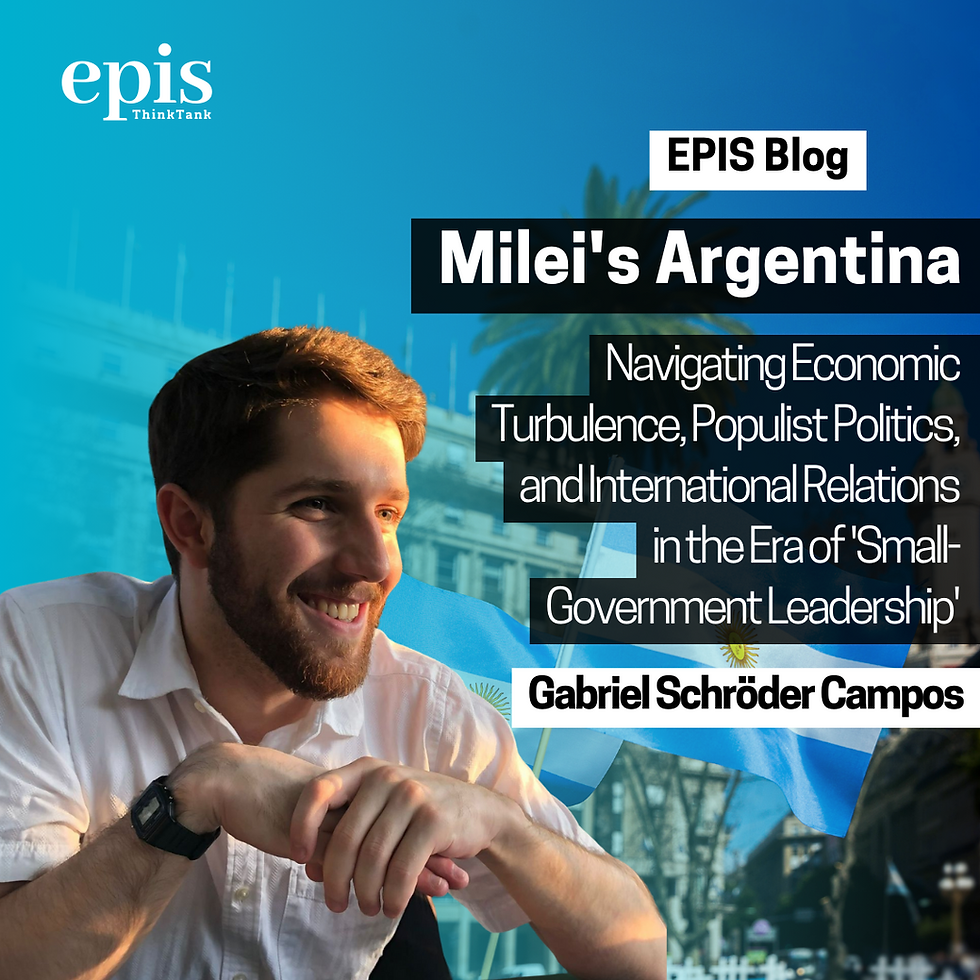
In the midst of Argentina's economic turbulence and political discontent, the emergence of political outsider Javier Milei and his libertarian agenda has sparked both hope and scepticism.
Introducing Milei: Unraveling Policy and the Political Landscape
The frequent comparison between Milei and other right-wing, traditionalist, and iron-fisted figures in Latin America, such as ex-president Jair Bolsonaro in Brazil and Bitcoin-promoter turned authoritarian Nayib Bukele in El Salvador, obscures the nature of Milei’s policy agenda, the seriousness of Argentina’s longstanding economic challenges, and the faulty decision-making of previous Peronist and Liberal governments, especially the one Milei succeeded. As an unapologetic, overtly verbal libertarian infatuated with neoclassical economic thought, Milei is an academic-turned-politician who promises to unshackle the economy from longstanding protectionism through the adoption of instantaneous austerity measures, such as the elimination of foreign exchange restrictions, the reduction of Argentina's 18 ministries to only 9, the 'explosion' of the central banking system, the deregulation of gun possession, a possible legalization of private organ harvesting and trade, and the potential dollarization of the economy.
His main campaign opponent, the Peronist/Kirchnerist ‘Union Por la Patria’ (transl. Aside from the economic turbulence, the previous presidency of Alberto Ángel Fernández tackled the COVID-19 pandemic with a rather lacklustre governmental response, worsened Argentina’s credibility with the IMF, and re-awakened the ghost of clientelism with the ascension of Cristina Fernández de Kirchner as Vice President, severely deprecating the party’s faith within voters.
Aside from capitalizing on the widespread anti-establishment populist sentiments that persist in Argentina from one legislative period to the other, Milei outran his competition by selling himself as a 'character' and candidate vice-versa throughout the electoral campaign: a minarchist, educated, and a new face in the political scene on one side, while acting in rage-fits, obsessing over his cloned dogs, wielding chainsaws in public next to his supporters, and hinting at a romantic relationship with his campaign strategist (and sister) Karina Milei on the other. Backtracking to Milei’s political plans and ambitions, it is without a doubt that Argentina’s material and crude wealth would be first on the list for economic extraction.
Economic Challenges and Political Landscape
In hindsight to Argentina’s vast array of grasslands and untouched resources, previously held under state protection by Peronist federal and local governments, Milei’s arrival to the Casa Rosada could represent an opportunity for pro-business groups to extend Argentina’s energy, agriculture, and space sector. Partnerships and targeted investments in the lithium industry could harness vital energy infrastructure while boosting a possible economic de-centralization from the Buenos Aires Province and CABA (Autonomous City of Buenos Aires).
Building political support for his reforms and assembling a competent administration would be Milei's first priorities, albeit ensuring this degree of governability will not come off easily. Milei's political party, La Libertad Avanza, currently holds only 7 out of 72 senatorial seats and 38 out of 257 deputy seats in the Argentine legislature. The support of ex-president Mauricio Macri (2015-2019) would be crucial, as he can provide additional seats in Congress and offer experienced former officials to come to Milei's aid. Notably, some potential ministers in Milei's administration have previously served under Macri, including Patricia Bullrich, again heading the Ministry of Security, and Luis Caputo, serving as Minister of Economy after other candidates for the position fell through. Finally, Milei would also need to reach out to the Peronists, whose party would have to procure a political restart, after a chaotic time in power and a painful electoral defeat.
Global Impact: Mercosur, International Relations, and Ideological Backtracking
Regarding Argentina's regional and multinational core institution, Mercosur (transl. ‘Common Market of the South’), Milei's decision-making and solely Argentine-centered interests could sour relations and cooperation with its member states, consisting of Brazil, Paraguay, and Uruguay. Back in August during his campaign rallies, Milei expressed that Mercosur "is a trade administered by states to favour businessmen" and that this "does not generate welfare," but "income for friends of power," which is "truly horrendous." Milei’s previous judgments regarding the trade organization were rather coated in a populist outcry before the election, rather than macroeconomic arguments after it.
For Argentina, leaving Mercosur would go along with destabilizing political and economic costs. Perhaps that was why, a week after Milei’s election victory in November, his incumbent foreign minister, Diana Mondino, exhibited a stark change in tone, expressing to her Brazilian counterparts Argentina’s desire to be a part of a "bigger, improved Mercosur." As a result of Mercosur, the elimination of import and export tariffs on trade among its constituent countries, and its common external tariff, designed to create a level internal playing field among its member states, Argentine trade with fellow Mercosur nations reached US$35 billion in 2022. Milei contends that the mentioned US$35 billion, consistent with previous years resulted in a deficit for Argentina, recording US$15.8 billion in exports and US$19.3 billion in imports. This fiscal result has prompted the current president of Argentina to express a commitment to pursue a more equitable distribution of benefits within the trade bloc, suggesting that, at least for the present moment, departing from Mercosur is not a politically viable option.
Outside of the Latin American political sphere, Milei’s ascension to the presidency foremost attracted the interest of Western leaders and statesmen. Milei’s first trip as president-elect was to the United States, where he met with former President Bill Clinton and National Security Adviser Jake Sullivan, while previously holding an amicable call with President Joe Biden. Aside from some issues concerning Milei’s denial of climate change, the U.S. government can find common ground in Argentina’s solid technical base and emerging commercial capabilities to support Argentina’s stance at the International Monetary Fund, while Milei is already willing to position himself against left-wing dictatorships in Cuba, Nicaragua, and Venezuela, previously seen as neutral partners by Peronist governments. Seeing Israel as a "natural ally" (due to his fascination with Judaism), Milei vowed that "the forces of heaven" and Argentina would support the nation’s existence in the Middle East, while with regards to the People’s Republic of China, albeit a socialist country, Milei has softened his stance on Beijing, a necessity given the close economic ties between the two countries. China buys nearly ten per cent of all Argentine exports (particularly soybeans) and extended a US$20 billion currency swap line to shore up Argentina’s reserves. Argentine lithium and infrastructure sectors witness substantial engagement from Chinese corporations.
Assessing Argentina's Political Future: Navigating Challenges in an 'Experimental' Economic Fashion
The key question is how long Milei can blame Argentina’s established political class for the country’s woes without losing its undeniable collaboration to govern. Nonetheless, Argentina’s moribund economy might just be the key for Milei to come out on top of his presidency, as Argentina has enjoyed a relatively stable, nonviolent political system in the last few years. Therefore, Milei would logically play into his strengths as an economist, although the intertwining between fiscality and social policy will not come hand-in-hand with the wishes and soft power of the Peronist factions, trade unions, and social movements.

Gabriel Alejandro Martin Schröder Campos is a Bachelor’s Political Science and Public Administration student at the University of Konstanz in Germany. He shares a great interest in International Relations and Conflict Studies. His area of expertise lies in the Latin American subcontinent, where he examines domestic political changes and foreign policy responses by global powers and organizations, shedding light on the intricate interactions that shape the region's geopolitical landscape.

Comments